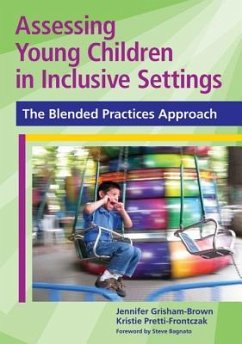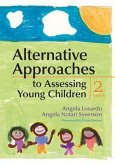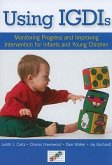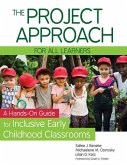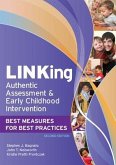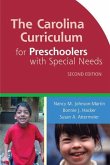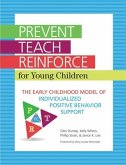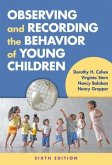Jennifer Grisham, Kristie Pretti-Frontczak
Assessing Young Children in Inclusive Settings
The Blended Practices Approach
Jennifer Grisham, Kristie Pretti-Frontczak
Assessing Young Children in Inclusive Settings
The Blended Practices Approach
- Broschiertes Buch
- Merkliste
- Auf die Merkliste
- Bewerten Bewerten
- Teilen
- Produkt teilen
- Produkterinnerung
- Produkterinnerung
A comprehensive textbook that provides an in-depth blueprint for high-quality assessment in today's age of inclusion, standards-based education, and accountability. It provides the research and recommended practices needed to conduct authentic assessment during children's natural routines and play activities; use assessment to inform effective program planning; involve families as collaborative partners; conduct eligibility assessments; assess children with diverse abilities; and collect reliable program evaluation data.
Andere Kunden interessierten sich auch für
![Alternative Approaches to Assessing Young Children Alternative Approaches to Assessing Young Children]() Angela LosardoAlternative Approaches to Assessing Young Children41,99 €
Angela LosardoAlternative Approaches to Assessing Young Children41,99 €![Using Igdis Using Igdis]() Judith CartaUsing Igdis38,99 €
Judith CartaUsing Igdis38,99 €![The Project Approach for All Learners: A Hands-On Guide for Inclusive Early Childhood Classrooms The Project Approach for All Learners: A Hands-On Guide for Inclusive Early Childhood Classrooms]() Sallee BenekeThe Project Approach for All Learners: A Hands-On Guide for Inclusive Early Childhood Classrooms42,99 €
Sallee BenekeThe Project Approach for All Learners: A Hands-On Guide for Inclusive Early Childhood Classrooms42,99 €![Linking Authentic Assessment and Early Childhood Intervention Linking Authentic Assessment and Early Childhood Intervention]() Stefano J BagnatoLinking Authentic Assessment and Early Childhood Intervention51,99 €
Stefano J BagnatoLinking Authentic Assessment and Early Childhood Intervention51,99 €![The Carolina Curriculum for Preschoolers with Special Needs The Carolina Curriculum for Preschoolers with Special Needs]() Nancy Johnson-MartinThe Carolina Curriculum for Preschoolers with Special Needs56,99 €
Nancy Johnson-MartinThe Carolina Curriculum for Preschoolers with Special Needs56,99 €![Prevent-Teach-Reinforce for Young Children Prevent-Teach-Reinforce for Young Children]() Glen DunlapPrevent-Teach-Reinforce for Young Children46,99 €
Glen DunlapPrevent-Teach-Reinforce for Young Children46,99 €![Observing and Recording the Behavior of Young Children Observing and Recording the Behavior of Young Children]() Dorothy H. CohenObserving and Recording the Behavior of Young Children38,99 €
Dorothy H. CohenObserving and Recording the Behavior of Young Children38,99 €-
-
-
A comprehensive textbook that provides an in-depth blueprint for high-quality assessment in today's age of inclusion, standards-based education, and accountability. It provides the research and recommended practices needed to conduct authentic assessment during children's natural routines and play activities; use assessment to inform effective program planning; involve families as collaborative partners; conduct eligibility assessments; assess children with diverse abilities; and collect reliable program evaluation data.
Produktdetails
- Produktdetails
- Verlag: Brookes Publishing Company
- Seitenzahl: 288
- Erscheinungstermin: 5. Oktober 2010
- Englisch
- Abmessung: 255mm x 180mm x 13mm
- Gewicht: 499g
- ISBN-13: 9781598570571
- ISBN-10: 1598570579
- Artikelnr.: 30513294
- Verlag: Brookes Publishing Company
- Seitenzahl: 288
- Erscheinungstermin: 5. Oktober 2010
- Englisch
- Abmessung: 255mm x 180mm x 13mm
- Gewicht: 499g
- ISBN-13: 9781598570571
- ISBN-10: 1598570579
- Artikelnr.: 30513294
Anna H. Hall, Ph.D. is Assistant Professor of Early Childhood Education in the Eugene T. Moore School of Education at Clemson University. She earned her Ph.D. in Interdisciplinary Early Childhood Education from the University of Kentucky. Julie Harp Rutland, M.S. is Assistant Professor of Early Childhood, Elementary, and Special Education at Morehead State University. She is a Ph.D. candidate in Interdisciplinary Early Childhood Education at the University of Kentucky. Dr. Grisham is Professor in the Interdisciplinary Early Childhood Education program at the University of Kentucky, Lexington. She received her doctorate in education from the University of Kentucky. She is also Faculty Director of the Early Childhood Laboratory at the University of Kentucky, an inclusive early childhood program for children from birth to 5 years of age. Dr. Grisham has directed research projects on topics including linking assessment and instruction, early care and education program quality, and individualizing instruction for young children with disabilities. In addition, she has conducted research on the effectiveness of instructional procedures that are embedded into developmentally appropriate activities, the application of multi-tiered systems of support in early childhood settings, and coaching teachers and caregivers to implement evidencebased instructional strategies with fidelity. Dr. Grisham is Project Director for the Kentucky Deaf-Blind Project, which provides technical assistance to families and service providers of infants, toddlers, children, and youth with deaf-blindness. She coauthored a book titled Reach for the Stars: Planning for the Future (with D. Haynes; American Printing House for the Blind, 2013), which is used to support families of young children in planning for their childrenâ (TM)s future and articulating their priorities to educational team members, as well as Blended Practices for Teaching Young Children in Inclusive Settings, Second Edition (with M. L. Hemmeter; Brookes Publishing Co., 2017), and Assessing Young Children in Inclusive Settings: The Blended Practices Approach (with K. Pretti-Frontczak; Brookes Publishing Co., 2011). Finally, Dr. Grisham directed the nationwide field test for AEPS-3. Dr. Grisham is frequently asked to provide professional development to state departments of education, universities, and local education agencies on topics for which she conducts research throughout the country. Dr. Grisham is co-founder of a childrenâ (TM)s home and preschool program in Guatemala City, Hope for Tomorrow, where she accompanies students for the education abroad program. Dr. Grisham also works internationally in other locations to promote inclusion of young children with disabilities. Dr. Kristie Pretti-Frontczak is a highly sought-after speaker, accomplished author, and educatorsâ (TM) educator. With nearly three decades of educational experience, Kristie cultivates real change within educational systems. She instills an impressive sense of joy, humor, and fun in creating inclusive educational practices and empowering teachers and leaders to spread wellness both in and beyond the classroom walls. Along with Dr. Julie Causton, at Inclusive Schooling, Kristie designs and delivers transformative professional development that addresses and supports the wholeness of the adult professional and helps leaders create school cultures that ensure all children experience a sense of belonging. Kristie spent 16 years, as faculty, at Kent State University and has published extensively in peer-referenced journals and is an author of over 10 books and monographs. Since 2013 she has followed her true passion, which is supporting adult learners. As a result, she has accumulated over 50,000 hours of helping educators and leaders work from a place of compassion, hope, and love in locations from Cincinnati to Singapore. She currently resides in Northeastern Ohio. You can learn more about Kristie and Inclusive Schooling at www.inclusiveschooling.com. Check out our spotlight on Kristie Pretti‐Frontczak! Discover bestselling books, an engaging webinar recording on inclusion, and download a free classroom poster! Stephen J. Bagnato, Ed.D., NCSP, is a developmental school psychologist and professor of pediatrics and psychology at the University of Pittsburgh Schools of Medicine and Education. Dr. Bagnato holds joint appointments in psychology in education/applied developmental psychology and clinical/developmental psychology at the university. He is Director of the Early Childhood Partnerships Program at the university and Core Interdisciplinary Leadership Team Faculty Member for The University, Community, Leaders, and Individuals with Disabilities (UCLID) Center at the University of Pittsburgh. In 1986, Dr. Bagnato received the Braintree Hospital National Brain Injury Research Award for his research on the impact of interdisciplinary intervention for young children with acquired and congenital brain injuries. In 2001, he was recipient of the University of Pittsburgh Chancellor's Distinguished Public Service Award for the innovation and community impact of his consultation and research programs in early childhood partnerships, and in 2008, Dr. Bagnato received The Pennsylvania State University Excellence in Education Alumni Award for his career of innovative national and international service and research in education and psychology. Dr. Bagnato was recently appointed to Governor Rendell's Pennsylvania Early Learning Council, a task force to influence early childhood intervention policy and practices through systems integration efforts among education, public welfare, and health. Dr. Bagnato specializes in authentic curriculum-based assessment and applied program evaluation research for infants, toddlers, and preschoolers at developmental risk and with neurodevelopmental disabilities and neurobehavioral disorders and their families. He has published more than 120 applied research studies and professional articles in early childhood care and education, early intervention, early childhood special education, school psychology, neurodevelopmental disabilities, and developmental neuropsychology. Dr. Bagnato is Director of Early Childhood Partnerships (ECP; http: //www.earlychildhoodpartnerships.com), a community-based consultation, training, technical assistance, and research collaborative between Children's Hospital and The UCLID Center at the University of Pittsburgh with community partners. For more than 10 years, Dr. Bagnato and his ECP program have been funded by the Heinz Endowments to conduct longitudinal research on the impact and outcomes of high-quality early childhood intervention programs on nearly 15,000 high-risk children in 30 school districts and regions across Pennsylvania (e.g., Early Childhood Initiative, Pre-K Counts). Dr. Bagnato is a fellow of the American Psychological Association (APA) in Division 16 and he received the 1995 Best Research Article Award from Division 16 of APA (with John T. Neisworth) for his "national study on the social and treatment invalidity of intelligence testing in early childhood intervention." He is coauthor of the professional "best practice" policy statements and standards on early childhood assessment, evaluation, and early intervention for The National Association of School Psychologists and the Division for Early Childhood of the Council for Exceptional Children.

